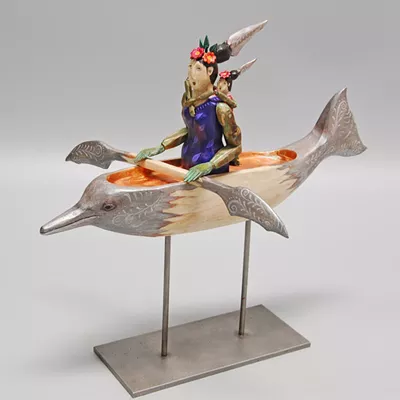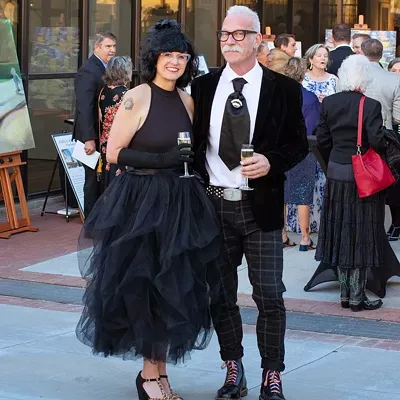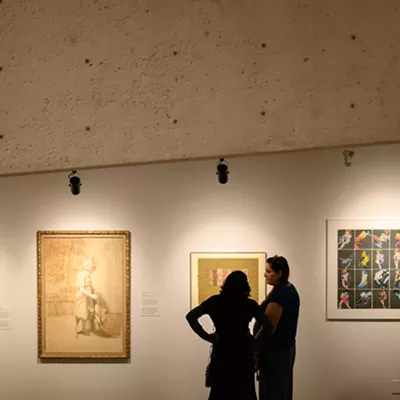"I climbed a tree to see FDR."
That's by far the most common refrain actor/writer James Gooden has heard in the years he has been performing "The Fireside Chats with FDR," which will be featured this weekend for three performances at the Comedy Playhouse. Gooden says there have always been plenty of audience members who are more than willing to share their personal memories and stories relating to Franklin D. Roosevelt, our 32nd president.
Of course, he is arguably the most prominent leader of the 20th century. And with Ken Burn's fabulous series airing recently on PBS, there will probably be a few new fascinated fans.
Gooden's journey with FDR began in 2007, as a "happy practicality," he says. He was associated with the now-closed Top Hat Theatre Club since its inception. "Our pockets were just not deep enough when the recession took hold. And, at the same time, Samuel French and Dramatists Play Service had doubled their rates for royalties." A show was needed rather quickly, and Gooden realized that there was one lurking in plain sight in the transcripts of the 30 "chats" FDR made by radio from 1933 to 1944.
The country was dealing with a banking crisis, which had folks reeling. There was a war brewing and then playing out. FDR recognized that the radio waves held great power in their reach and that his ability to speak directly and conversationally gave him great power to connect in an almost personal way with his audience.
"It seemed to me that for a number of years, conservatives had been trying to make patriotism their thing, and that didn't sit right with me. I happen to sympathize with FDR's importance and his accomplishments. So, when we needed a show it made sense to me to look at the 'chats,' and the first show was put together using material from the chats verbatim," Gooden says
In the years since 2007, Gooden says there have been "multiple revisions," including incorporating Gooden's wife, Elizabeth, as Eleanor. The character brings an additional dimension, and "the dialogue makes it work better theatrically," he says. "There's an enormous amount of material in the chats, so I can pick and choose." FDR's challenge of the monied class, and their control and the creation of opportunity for small family farmers, were important issues to include., Gooden adds.
That he actually visited farmers devastated by the Dust Bowl, and helped bring electricity to an entire area by creating the Tennessee Valley Authority—things that affected individual lives were also important to address. And Roosevelt utilized a conversational style in the chats which underscored that sense of a personal relationship and connection.
Gooden says he connects with FDR, and as an actor it's "terrific to agree" with this character he explores. "I can happily associate with him and his ideas," he says. And some of these issues are still timely today.
For all the positives in his work and his character, there are negatives as well, and some of these are part of his portrayal. His extramarital affair, his two-faced manipulation of many, as well as his failure to make sure he had reliable political advisors which lead to some unwise decisions—these things humanize him, Gooden says. "And really, I think he was a pretty lonely man."
Gooden has been a character in Tucson's theater world for years. He was one of the creators of Live Theatre Workshop and was there for nine years. Then there was the Top Hat. He was associated with the Gaslight Theatre on and off and on for 15 years. In recent years he has discovered that he really enjoys writing plays—he's written over a dozen—and wants to make that a priority now. He is directing his play "Tinsel Town," which opens at the Comedy Playhouse in August.
Gooden says he's been amazed at the passion audiences have for FDR, wanting to share their stories, sending him anecdotes and memories, some of which he's incorporated into the show. This is really a historical play, he says, but their "appreciation transcends" mere historical interest. There is nostalgia for some, of course, and there's plenty of humor.
Although Roosevelt used his "chats" to help convert people's support of his New Deal, Gooden realizes he is "playing to the choir. I don't need to convince folks that FDR's accomplishments have affected all of us, and mostly in a good way."
But he can offer insights and information and a real and tangible relationship with a carefully developed character, right within their reach.







